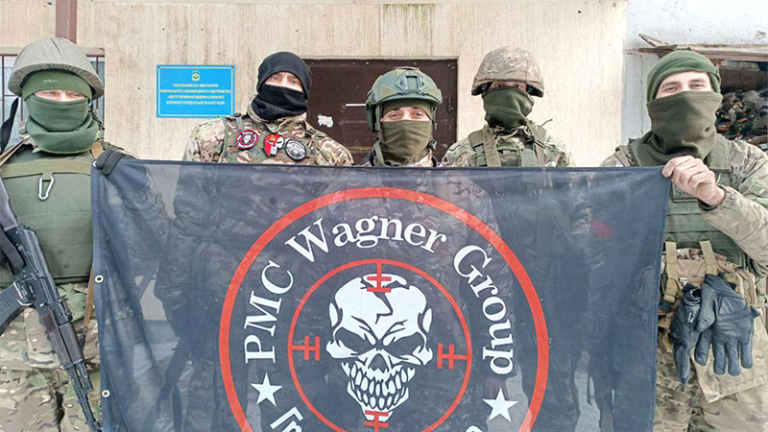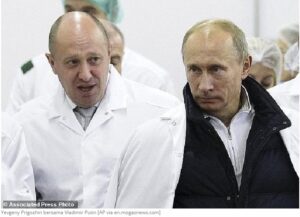
STRATEGIC ASSESSMENT. While global attention on Russia this week has been focused on the lightning-fast mutiny of the Wagner Group and its chief, Yevgeny Prigozhin (whose dealings are covered in TSC’s new special report), other news items that would ordinarily dominate the conversation around Russia signal new lows in Russian President Vladimir Putin’s disregard of international norms. Combined with the remarkable act of defiance against Putin’s once seemingly ironclad grip on power, some of these issues also call into question what a post-Putin Russia could look like, and whether that would necessarily be an improvement for its domestic politics or international relations.
The short-lived Wagner revolt, for instance, overshadowed revelations earlier this month of a Russian plot to assassinate a CIA informant on American soil in 2020. According to a report initially disclosed by Calder Walton, a British historian and scholar on national security and intelligence at Harvard University, and separately confirmed by the New York Times, an undercover operation was underway to assassinate Aleksandr Poteyev, a former Russian Intelligence officer-turned-CIA informant, who was residing in Miami, Florida. Russian officials coerced a Mexican scientist into attempting to carry out the assassination by threatening his wife and her two children, who were residing in Russia. This event, which contributed to the expulsion of ten Russian diplomats from the United States in April 2021, serves as a glaring example of Putin’s increasing disregard for international norms. However, Russian attempts to kill informants on Western territory are not unprecedented. A similar instance occurred in 2018 with the attempted assassination of Sergei Skripal, another Russian intelligence officer-turned-informant who was living in the United Kingdom at the time. Additionally, Germany expelled two Russian diplomats after a former commander of Chechen rebels, Zelimkhan Khangoshvili, was murdered in 2019 in Berlin, where he lived as an asylum seeker. And in 2016, former Russian spy was poisoned in his London hotel, reportedly by Russian operatives.

These assassination plots speak to Putin’s increasing brazenness in defying normative expectations over the past decade. Earlier this year, Russian military officers were suspected of having directed a white supremacist group in Spain to carry out a letter bomb campaign, targeting the prime minister, the defense minister, and foreign diplomats. This comes on the heels of reports that Russia has supported extreme right-wing parties across the West to weaken states. These groups are known to spew anti-LGBTQ+, chauvinistic, revanchist and antisemitic rhetoric. Most recently and significantly, however, this culminated in Putin’s full-scale invasion of Ukraine. But it can also be seen in the increasingly harsh repression enforced against his domestic political opponents as well as his jailing of the American journalist Evan Gershkovich, and the ten month detention of U.S basketball player Brittney Griner, who was swapped for a Russian detainee in the U.S, Viktor Bout, a former Soviet military officer arrested on charges of conspiring to kill Americans, which the Kremlin called baseless. Last week, a Russian court rejected Gershkovich’s appeal against the extension of his pre-trial detention through the end of August. Gershkovich’s arrest in March, based on allegations of seeking to obtain state secrets that have been disputed by The Wall Street Journal, his employer, and the United States, marks a stark regression in U.S.-Russian relations, as he became the first American reporter to face treason charges in Russia since the Cold War. Meanwhile, jailed Russian opposition leader and anti-Putin activist Aleksei Navalny has stated he now faces terrorism charges, which could add an additional 30 years to his current eleven-year prison sentence. Navalny, who gained notoriety in 2020 following a failed poisoning attempt believed by many observers to have been orchestrated by the Russian government, was widely regarded as the greatest challenger to Putin’s rule before his incarceration in 2021.
As events unfolded last weekend left international spectators waiting to see if Prigozhin’s military incursion into Russia might result in a post-Putin Russia, it is worth analyzing the profiles of those popular figures who might seek to fill Putin’s vacuum, and what values and positions they would bring to the role. For those who may believe anybody would be an improvement over Putin’s hawkish and repressive rule, it is worth noting that some of Russia’s most prominent figures would not necessarily take Russia in a more democratic direction, nor do they appear inclined to patch up relations with the United States or its allies.
Consider Navalny, a crusader against the corruption of the Putin regime and the first domestic figure to pose a significant threat to Putin’s long-held grip on power. At the height of his fame, Navalny was heralded as Russia’s best chance for liberalization. However, Navalny’s nationalistic past was often overlooked in this discussion, one which he has refused to condemn. After losing Moscow’s mayoral race in 2013, where he ran an anti-migrant campaign, he has since reportedly toned down his nationalist rhetoric. In the past, though, he actively supported Russia’s short-lived 2008 war against Georgia and used derogatory terms against Georgians in his blog posts. He also participated in nationalist parades, endorsing a nationalist-led campaign called “Stop Feeding the Caucasus,” where he mocked Muslims living in the region. Navalny has also referred to the Caucasus as a lawless “off-shore zone,” and in a notorious video in 2007 he referred to Muslim militants as flies and cockroaches that he hoped to “exterminate.” He has also advocated for the deporting of undocumented immigrants and the implementation a visa system targeting Central Asian nations, and he has also been accused of routinely using slurs. His nationalist views and “activities” got him expelled out of the liberal democratic and anti-Kremlin political party, Yabloko, in Russia.
With Navalny’s political prospects seemingly terminated so long as he remains in prison, Yevgeny Prigozhin had become a formidable figure in the public eye. According to a poll by one pro-Putin, Russian news agency, Tsargrad, Prigozhin was found to be the second-most popular option for president behind Putin. It is also worth noting that Putin’s popularity may be inflated, as Russians may feel unsafe voting against him even in a mock election. Under Prigozhin’s command, the Wagner Group has engaged in destabilizing activities across Africa – where his organization has been accused of smuggling and war crimes and crimes against humanity, including the massacre of hundreds in Mali. The private military company has also been accused of supporting the brutal campaign of Bashar al-Assad in Syria and allegedly carrying out heinous acts of violence against civilians in Ukraine. Prigozhin also has links with far-right groups, and, notably, Wagner commander Dmitry Utkin is covered with numerous Nazi tattoos. Prigozhin’s association with the right wing, coupled with his popularity among Russians, prompts a critical examination of the country’s political climate. While some Western onlookers may be enthusiastic about the prospect of a regime change in Russia, this does not necessarily mean it would result in liberalization or democratization for the state. Although it is difficult to predict what effect, if any, the Wagner mutiny will have on Putin’s regime, given the nationalist and far-right ties of his most prominent political opponents, observers should regard the possibility of a Putin-less Russia with caution.





